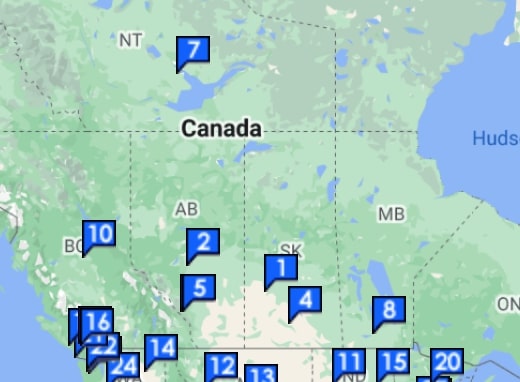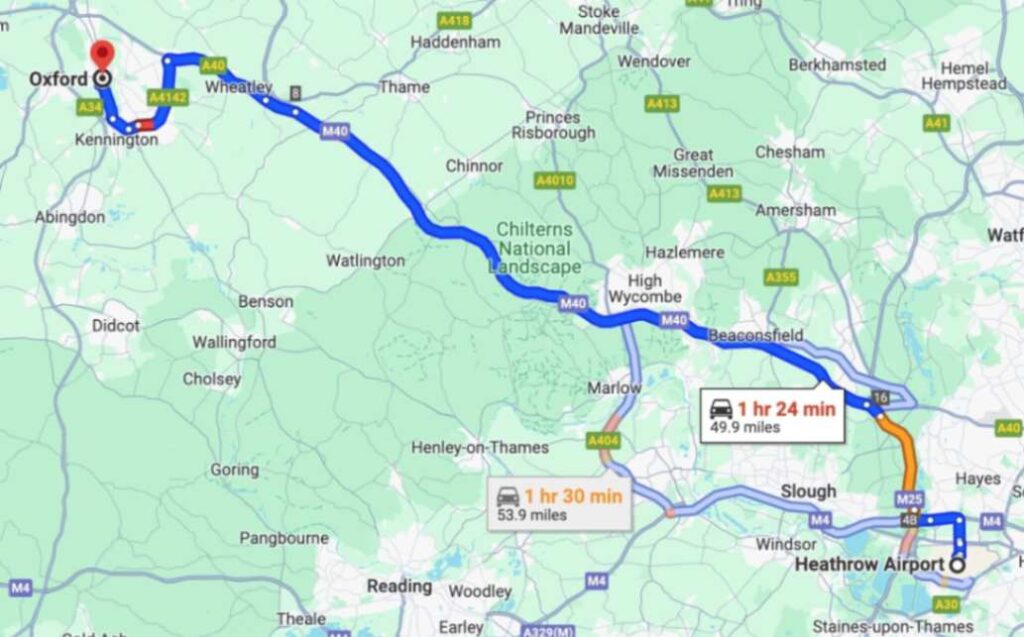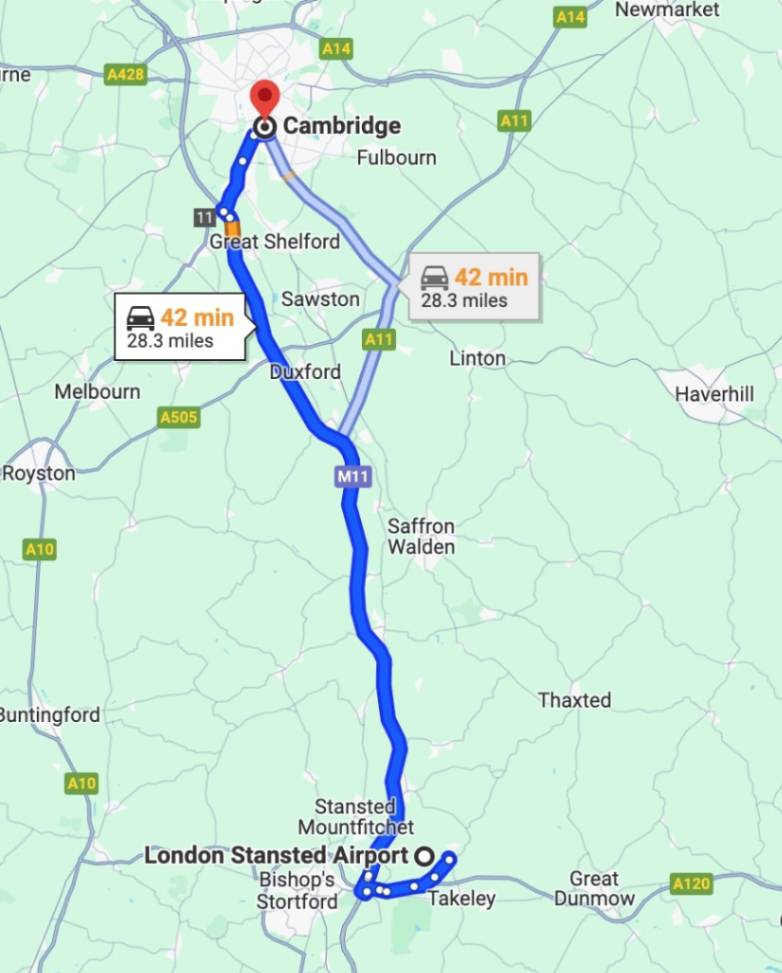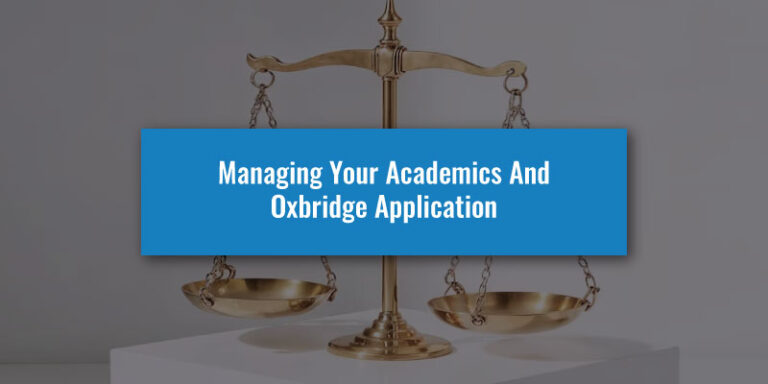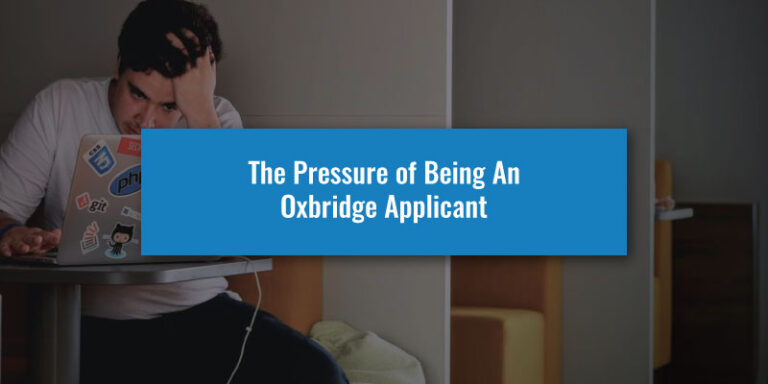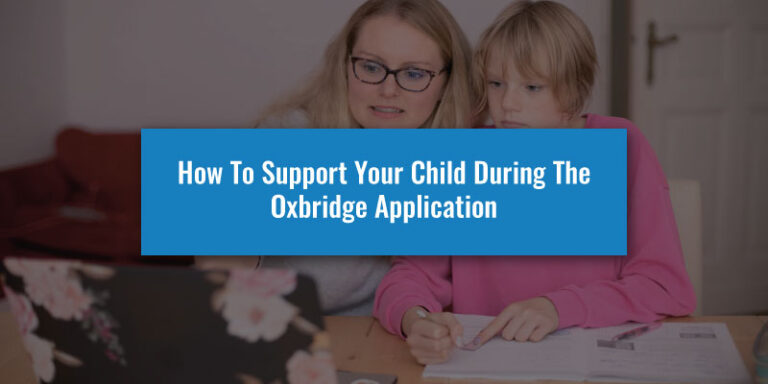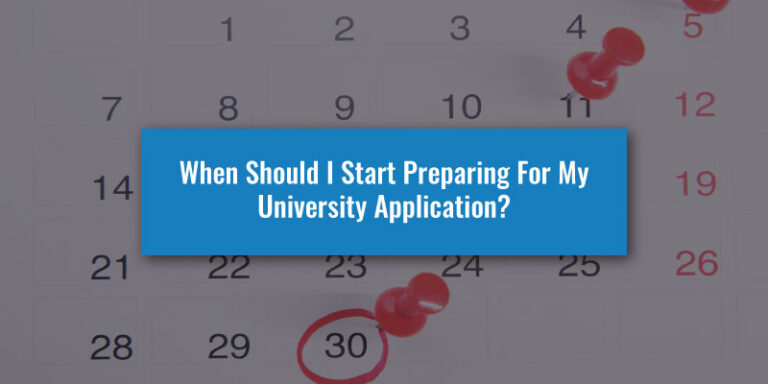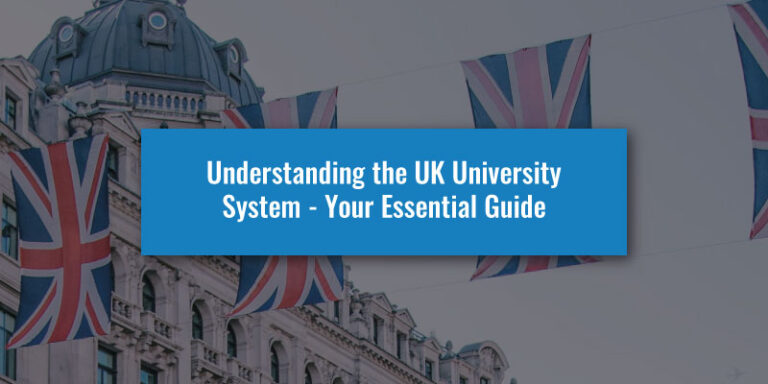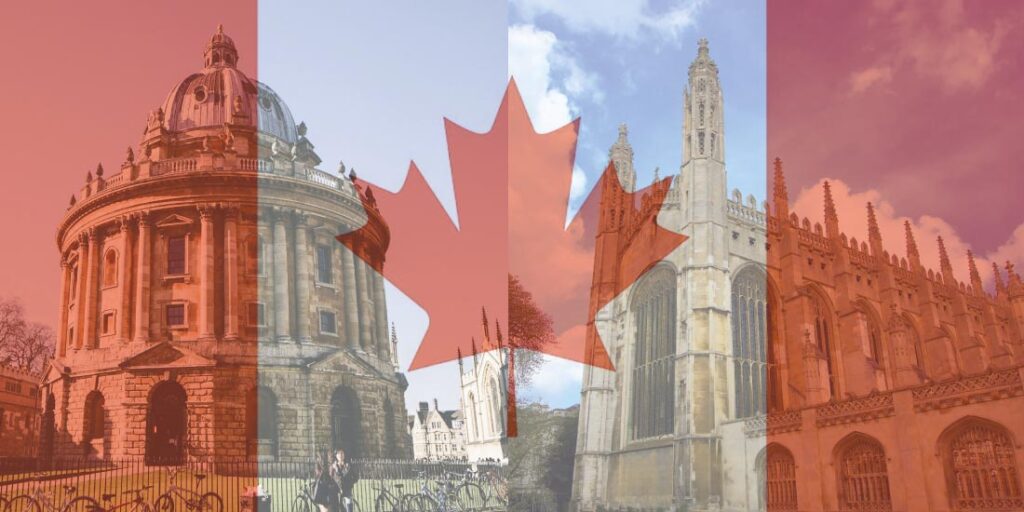
If you’re applying to the University of Oxford or the University of Cambridge from Canada – or any other country outside of the UK – you need to be prepared for an extremely challenging application process. Applying to any UK university from overseas is hard, but Oxford and Cambridge (together known as Oxbridge), are two of the most competitive universities in the world and have very limited spaces for international applicants.
In this guide, we’ll explore the entire process of applying to Oxford or Cambridge from Canada and learn what you need to do to boost your chances of earning your offer and securing your place.
We’ll also follow Liam, a Canadian Cambridge Medicine student who successfully got his offer. From his experiences, you should get a better idea of what it takes to become an Oxbridge student from Canada.

Liam
Cambridge Medicine Student
Should You Apply To Oxbridge From Canada?
Whether or not you’re certain that you want to apply to study at Oxbridge (or the UK in general), it’s important to ask yourself important questions to ensure it’s the right decision. These questions include:
- Is attending university right for me?
- What do I want to study?
- What do I want to do in the future?
- Where should I study? (Both university and country)
- How do I want to be taught?
- Am I confident in my application and abilities?
These are also relevant if you’re planning to study closer to home, but applying to Oxbridge and hopefully moving to the UK is a big commitment that you need to ensure is right for you. We say that the Oxbridge application is a big commitment because there are many challenges you’ll have to face to earn your place.
Challenges of Applying To Oxbridge From Canada
Acceptance Rates
Applicant acceptance rates at Oxbridge are some of the lowest in the world (Oxford – 13.9%, Cambridge – 16.6%). This is mainly because of how many applications are received each year (over 20,000 undergraduate applications per university) and how competitive many of these applications are. However, success rates are even lower for international applicants, with just 7.6% successful applicants at Oxford and 10.9% at Cambridge in 2023.
Looking at Cambridge’s success rates for Canadian applicants in 2023, we can see that just 9 out of 130 applicants were admitted to the university – 6.9%. This made Canada one of the worst-performing countries for the rate of successful applicants, and Oxford applicants did even worse. Between 2021 and 2023, only 5.8% of Canadian applicants were admitted – 50 out of 876 applicants.
Essentially, Canadian applicants have roughly a 5% – 6% chance of earning their offer, which means only the best of the best will earn their place.
Application Process
Due to how competitive the Oxbridge universities are, the application process is more in-depth and requires a lot more work. Beyond the standard application form, you’re also going to have to sit a unique admissions test for certain subjects and attend interviews before offers are released
All of this requires additional work to prepare for and may lead to a greater amount of stress, especially when considering how low the acceptance rates are. However, understand that if you’re capable of working through all of these steps at a high standard, you’re much more likely to earn your offer, especially when considering the majority of applicants will perform below average.
Cultural Differences
While the cultural differences between Canada and the UK aren’t as huge as other countries, it’s still important to consider that you’ll be in a new country and mostly surrounded by people from a different culture. Many of the differences may only be minor, but they can add up and make you feel homesick.
In most cases, language barriers won’t be a problem, but with so few Canadians being admitted each year, the lack of others from your home may lead to feelings of isolation. This is perfectly normal for someone who’s moved to a new country and will gradually fade away as you engage more with your course and spend more time with your peers.
Fees
For many considering an application to Oxbridge, the fees may not be the first thing you think about. However, it’s important to understand that attending Oxbridge from overseas is expensive.
For Oxford, annual fees range from around $53,490 (£30,050) to $86,550 (£48,620) per year. Cambridge charges between $45,800 (£25,734) to $119,600 (£67,194) per year.
Bursaries and scholarships are an option for applicants, but these are typically very limited and have strict criteria as UK bursaries are more commonly based on financial needs rather than academic merit.
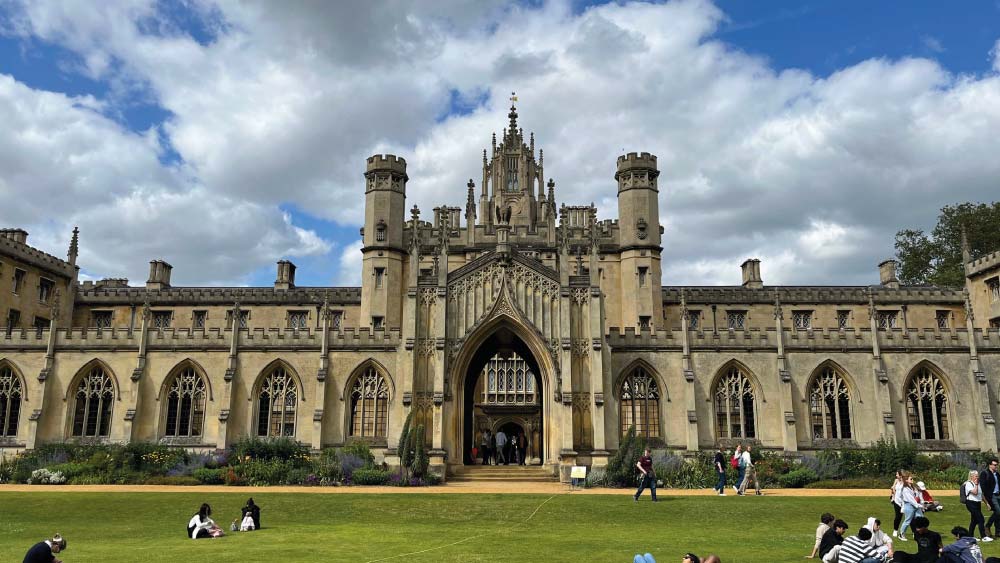
Benefits of Applying To Oxbridge
Despite all of these challenges, it’s important to consider why people apply in the first place. For some students, there are plenty of reasons why the rigorous application process is worth it:
World-Class Teaching
Firstly, if you’re considering Oxbridge, it’s probably because of the reputation it’s garnered as a pair of world-leading educational institutes. Oxford and Cambridge consistently appear in the Top 5 of global university rankings and the top spot of UK rankings.
This reputation isn’t unearned either, as Oxford and Cambridge each boast unique teaching styles, cutting-edge facilities, expert staff and world-leading research programmes. All of this, combined with the legacy, make Oxbridge the perfect place for those who want to prosper in their field.
The Oxbridge Experience
Being two of the oldest universities in the world, attending Oxbridge is a genuinely unique experience versus other universities in the UK and across the globe. There are many traditions that may be confusing at first, but those who attend Oxbridge are generally seeking to live out the full Oxbridge Experience.
This isn’t just about how you’re taught as it extends to everything from the buildings and the accommodation to the food and the social events. There’s nothing quite like Oxbridge and you’re sure to look back on your time there fondly.
Graduate Prospects
In most fields, Oxbridge graduates are considered the cream of the crop and will be highly desirable to employers. Your status as an Oxbridge applicant doesn’t guarantee you an amazing job straight away, it will certainly help you throughout your career.
Why Apply In The UK Over Canada?
Canada has some truly fantastic universities that place highly in global rankings, including the University of Toronto and the University of British Columbia. However, there are also many reasons why you may wish to study in the UK instead, particularly Oxbridge.
You may want to see new places in the world, you may not be satisfied with the local course options for your subject or you may just want to make professional connections in the UK. Either way, the most important thing is that you’re choosing your university because of what you want, not because of societal pressures or reputation.

When it comes to choosing Oxbridge over other UK universities, we’ve already seen why you might pick Oxford or Cambridge. The prestige, the teaching standards and the unique experience all combine to make a university experience unlike any other.

If all of that sounds appealing to you, and you’re ready to take on the challenges that come with the application process, then applying to Oxbridge will definitely be a good decision. Whether or not you earn your place, you will know that you tried your best and gave yourself the best chance of success.
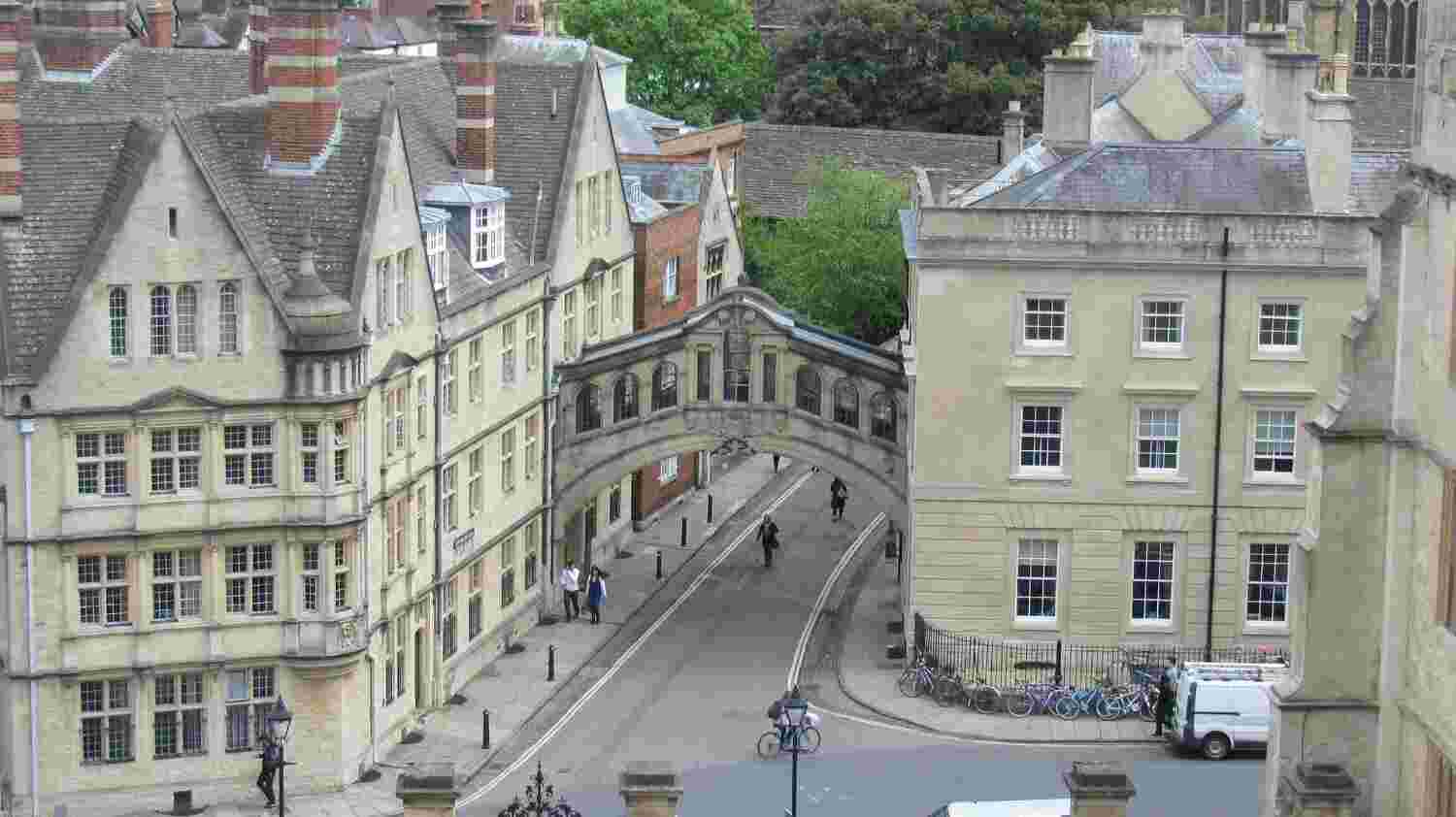
We support Oxbridge applicants across the globe to get their Oxbridge offer
Our Full-Blue Programmes are suitable for anyone who is dedicated to getting their offer at Oxford of Cambridge, no matter where you’re from. Our students have access to everything they need to prepare for each stage of the admissions process.
This includes one-to-one tuition, hundreds of preparation materials, live courses, unlimited Personal Statement/essay marking and much more. Our support is suited to your needs to ensure you get the most of it.
Discover our Full-Blue Programme by clicking the button below to learn how you can enrol and triple your chances of success.
Getting Into Oxbridge From Canada - First Steps
Before you start building your application, you need to do your research, as there are many considerations to think about. Here are some of the first steps you’ll need to take to apply to Oxbridge:
Choosing Your Degree
For some, this may already have been done, but many applicants aren’t sure what they want to study before they start their application. In most cases, this is fine and just means you need to do some research beforehand to confirm what you want to study.
Even if you do know what you want to study, you still need to research if Oxbridge actually teaches it and what the course curriculum looks like, as well as the entry requirements for admission. If you know what career direction you want to pursue but aren’t sure what to study, you’ll need to see which degrees offer the best entryways to your desired field.
However, you may not have any idea what you want to study or what you want to do in the future. If this is the case, you may need to reconsider going to Oxbridge. While you may get good grades in your subjects, Oxbridge looks for more than this in applicants. They want to see an applicant who is genuinely passionate about what they want to study and someone who has engaged in their field as much as possible. If you aren’t sure what your desired field is yet, this isn’t possible to do, which means you likely won’t get an offer.

Oxford or Cambridge?
In some cases, this decision is easy, but others may struggle to choose between these two universities. While they both share many similar elements, there are lots of subtle differences that mean an Oxford and a Cambridge student will have very different experiences during their studies.
It’s sometimes said that Oxford is better for Humanities and Cambridge excels in STEM subjects. However, this isn’t really accurate, as both universities provide a world-class education in all disciplines. That said, each university does have an iconic course that contributes to this perception—PPE at Oxford and Natural Sciences at Cambridge. For a deeper dive into how these two universities differ, check out our Oxford vs Cambridge guide.
You’ll have to make this decision no matter what because no applicant is able to apply to both universities in the same application cycle. This is due to a restriction put in place by UCAS (more on that later).
Alternative Choices
As well as your Oxbridge application, you’ll also need to decide if you want to apply to up to four other universities in the UK. This is due to the UCAS system that you will have to use to apply to Oxbridge, which allows all applicants to apply for up to five universities at no extra cost.
If you’re not sure where to apply, research the G5 Universities and Russell Group Universities for more top-tier UK institutions. These all have high admissions requirements, so you might want to include a less competitive choice as well (make sure you’d actually be happy to attend this place).
If you’re not interested in any other UK universities, you’re not forced to select five options. However, it’s still worth researching to make sure you don’t want to pick any other options.
College Selection
Once you’ve chosen Oxford or Cambridge, you’ll also need to choose from one of 30+ colleges at each university. This is an additional consideration due to the collegiate system implemented by Oxford and Cambridge.
Colleges play a major role in your day-to-day life, as they’re responsible for things like accommodation, catering, social events and various aspects of teaching (including your Supervisions/Tutorials).
During the application process, colleges are responsible for admitting students, meaning the admissions tutors at the college will review your Personal Statement and admissions test result, conduct your interview and make the decision on who gets admitted.
When considering your college options, think about the following things:
- Location
- Accommodation
- Subjects covered (not every college accepts applicants from every course)
- Values/Traditions
Your decision should be based on what you’re looking for out of a college, as strategic applications don’t tend to work in applicants’ favour. Neither university has any specific international colleges for students, so you’ll have a fairly equal chance of success at any college you apply to.

Our guides to Oxford Colleges and Cambridge Colleges offer a perfect starting point for your own research to help you find your perfect college:
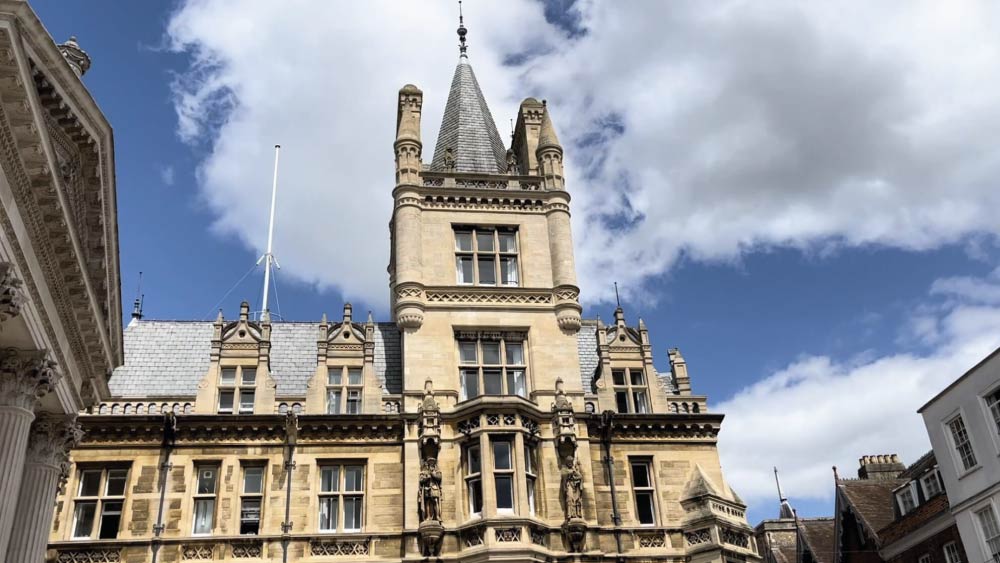
Application Support
Lastly, let’s consider what support options you have available to you. This is important as you shouldn’t have to go through this process alone and, with so many steps required, you’ll likely need to seek support for specific parts
School Support
Though your school’s primary job is to teach you the relevant curriculums for your subjects and prepare you for exams, they are also there to guide you into adult life. Part of this includes preparing you for your college/university education, which will be especially important for anyone applying to Oxbridge.
Your school may or may not be familiar with the Oxbridge application process, but they should still be able to help you prepare in some way, even if it’s just providing time and space to do so. If you’re lucky though, your school may be well prepared to help you through the process.

Not every applicant will be lucky enough to receive this level of support from their school, but that doesn’t mean that you won’t have a chance.
External Support
If you need more specific support for Oxbridge, there are lots of options available. These range from free services like videos and online guides to paid services like books, courses and even one-to-one tuition.
Ideally, you should look for support packages that cover every step of the process. While this can be a large investment, the benefits of having a single source of support throughout the entire process are massive, especially if they have a proven track record of getting people into Oxbridge. If possible, try to find a provider that offers tutors from both Canada and the UK to get different perspectives.
Beyond that, family and personal connections can be a great source of support, although not everyone will have access to this.

With all of these considerations out of the way, it’s time to dive into the actual application process!
Applying From Canada - UCAS Applications
The University and Colleges Admissions Service (UCAS) is an essential part of any UK university application as it is required to apply anywhere in the UK. UCAS is a centralised university application system that houses many of the essential aspects of university applications, including personal detail forms, education history, references and the Personal Statement.
As this system hosts everything in one place, universities in the UK don’t have specific application forms and applicants will only need to fill out their details once. Most importantly, you’ll be able to browse the different university options in the UK and select up to five to send your application to. This system has been well established in the UK for over 20 years, but it has some pros and cons:
UCAS Pros
- You’ll only need to fill out your personal details and education history once.
- The system is digital, so you can make amendments when needed until the submission deadline.
- The submission process is easy to complete anywhere in the world.
UCAS Cons
- You can’t personalise your application for each university you apply for.
- You’re limited to just five applications per year.
- You need access to a computer/phone with a stable internet connection to work on your application.
UCAS registration opens in mid-May each year and, in 2024, you can submit your application to universities starting from September. The standard UCAS application deadline is January 14th 2026, but all Oxbridge and Medicine applicants need to submit their application by October 15th 2025.
Your UCAS application will cost $49 (£27.50), which covers all of the application services offered. In 2025, this fee will be increased to $51 (£28.50).
Thankfully, the process is pretty easy, so you shouldn’t face any significant difficulties when setting up your UCAS profile and submitting your details – there are support customer services available if you do have trouble though.

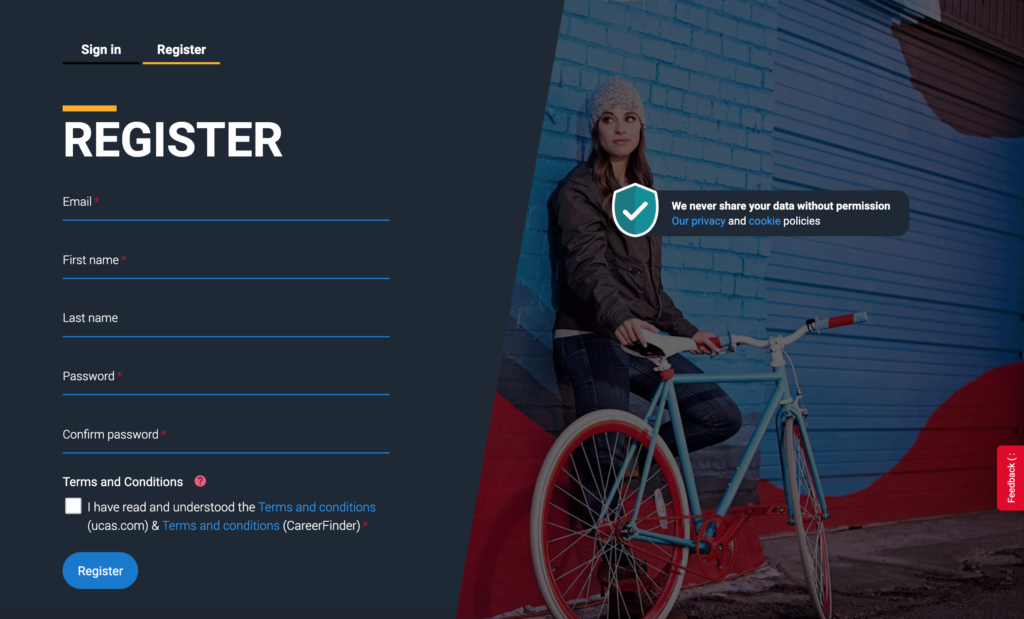
UCAS Reference
As previously mentioned, your application will require an academic reference. A teacher or faculty member will need to answer three questions regarding your studies and abilities. Someone at your school should be experienced in providing a UCAS reference, so be sure to seek their support. One of these questions pertains to any special circumstances that might affect your application, so make sure to discuss any relevant details with your referees.

Applying From Canada - Personal Statement
Just like university applications in Canada, UK universities require you to submit a Personal Statement. These statements serve the same purpose of showcasing your motivation, skills and interest in you subject to demonstrate why you deserve to be admitted.
Where UK Personal Statements differ is that you’re only able to write one, which is submitted to all of your university choices via UCAS. Just like the rest of the UCAS application, your Personal Statement needs to be submitted by October 15th if you’re applying to Oxbridge or medical school. The UCAS Portal has a space to write your statement, but we recommend writing it on external software first to allow for more thorough checks.
The statement itself takes a unique form, as you will need to answer three set questions instead of writing a full piece from scratch. These questions are:
- Why do you want to study this course or subject?
- How have your qualifications and studies helped you to prepare for this course or subject?
- What else have you done to prepare outside of education, and why are these experiences useful?
While Canadian Personal Statement requirements can vary in terms of minimum and maximum lengths, all UK Personal Statements allow a maximum of 4,000 characters. Each question in the statement needs to include at least 350 characters. It’s important to make the most of this space as it isn’t as much as it may seem.
When reading a Personal Statement, UK admissions tutors mainly want to understand what you have learned from your experiences and how you have grown into a suitable candidate. This means that your writing is going to have to be focused on your academics and extra/super-curricular activities, rather than the holistic approach that other countries take to Personal Statements.
You may be tempted to take shortcuts when writing your Personal Statement, like generating content with AI or rewording existing statements, but be aware that in-depth measures are in place to prevent this kind of work from being submitted to universities. Either way, taking these approaches is pointless as a Personal Statement needs to be personal to you, which can only be achieved by writing from your own motivations and experiences. You can learn more about the UCAS Personal Statement in our Ultimate Guide.
We would suggest reading some example Personal Statements for inspiration, especially from successful Oxbridge applicants. Our collection below covers a wide range of subjects from both universities (keep in mind that these statements were written in the previous format for UCAS Personal Statements and do not match the current structure):

While Personal Statements are an important part of your UCAS application, Oxford and Cambridge don’t place as much emphasis on them in their decision-making process. This is because they use other methods to assess a candidate’s potential, which they consider more significant. However, you should still put in the effort, as your statement will be reviewed by all the universities you apply to.
Access "The Oxbridge Application Vault"
- 300+ page ebook for Oxbridge Applicants
- 25 page ebook for Personal Statement
- 2h+ online course to succeed in any exam
- Online Oxbridge Success Calculator
- 12 page ebook about UniAdmissions
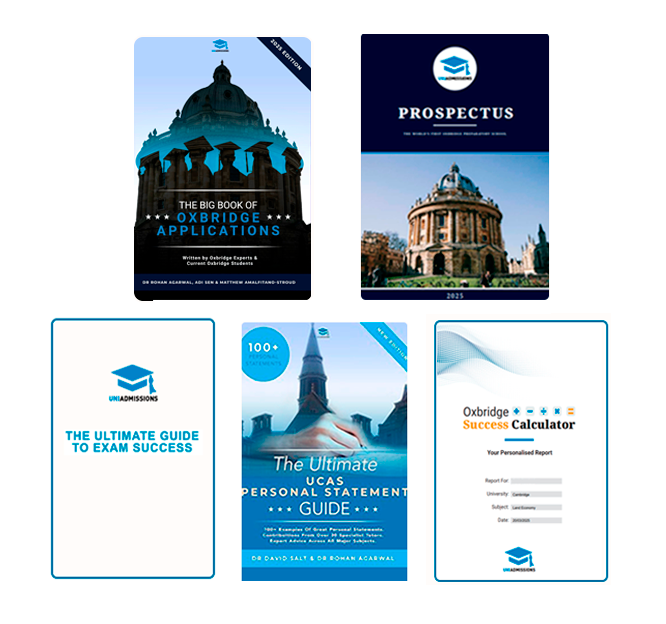
Access "The Big Book Of Oxbridge Applications" For FREE
If you want to get into Oxford or Cambridge from Canada, you need to be prepared for everything required of you. Download The Big Book Of Oxbridge Applications for free now to learn about the entire process through over 350 pages, where you’ll find:
- Over 40 admissions test practice questions
- 28 example Oxbridge Personal Statements
- Interviews with Oxbridge students and graduates
- Additional downloadable resources
Fill in your details below to claim your digital copy today!
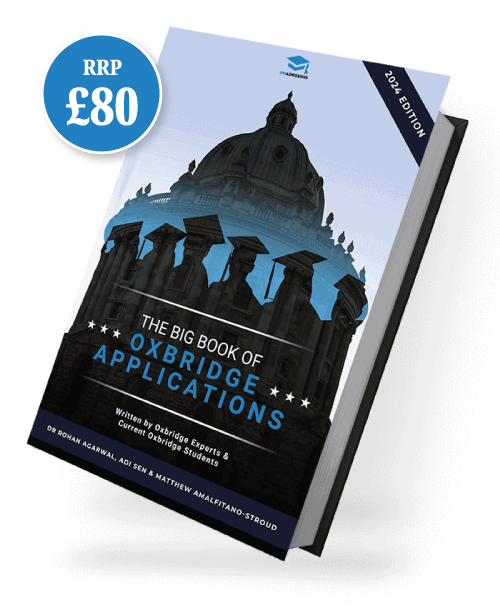
Getting Into Oxbridge From Canada - Oxbridge Admissions Tests
In addition to the UCAS application, Oxford and Cambridge have extra application requirements that are managed outside of the online UCAS portal. One of these is the admissions tests, which are intended to showcase your academic potential in a more specialised way than just grades.
At Oxford and Cambridge, there are a wide selection of admissions tests, including:
Oxford Admissions Tests
- Mathematics Admissions Test (MAT): Required for Mathematics and Computer Science (and joint courses)
- Physics Admissions Test (PAT): Required for Physics, Engineering and Material Sciences
- Thinking Skills Assessment (TSA): Required for PPE, Economics & Management, PPL and more
- Biomedical Sciences Admissions Test (BMSAT): Required for Biomedical Sciences
- Ancient History and Classical Archaeology Admissions Test (AHCAAT): Required for Classical Archaeology and Ancient History
- History Admissions Test (HAT): Required for History (and course variants)
- Modern Languages Admissions Test (MLAT): Required for Modern Languages and European & Middle Eastern Languages (and joint courses)
- Classics Admissions Test (CAT): Required for Classics (and joint courses)
- Philosophy Test (PhilAT): Required for Philosophy & Theology
Cambridge Admissions Tests
- Engineering and Science Admissions Test (ESAT): Required for Natural Sciences, Engineering, Veterinary Medicine and Chemical Engineering & Biotechnology
- Test of Mathematics for University Admissions (TMUA): Required for Computer Science and Economics
- History Admissions Assessment (HAA): Required for History (and course variants)
- Modern and Medieval Languages Admissions Assessment (MMLAA): Required for Modern & Medieval Languages and Asian & Middle Eastern Studies (and joint courses)
- English Admissions Assessment (EAA): Required for English
- Classics Admissions Assessment (CAA): Required for Classics
- Linguistics Admissions Assessment (LAA): Required for Linguistics (and joint courses)
- Philosophy Admissions Assessment (PAA); Required for Philosophy (and joint courses)
Oxford & Cambridge Admissions Tests
What Are The Oxbridge Admissions Tests?
In general, admissions tests are used to test an applicant’s academic or professional ability in either a general or specific context and this is no different for Oxbridge. Each test is designed to test applicants on relevant knowledge and skills required for their degree, whether it be subject-specific knowledge (e.g. science) or general thinking and problem-solving skills.
The format of admissions tests used by Oxbridge varies from multiple-choice quizzes to essay tasks and more (some tests feature multiple-question types). Be sure to review your course page to see which admissions test you need to sit.
How Do I Register For My Admissions Test?
The majority of admissions tests at Oxbridge are run by Pearson VUE, an organisation that specialises in computer-based testing. This means that all of their admissions tests are digital and must be taken at a registered Pearson VUE testing centre (home testing is sometimes available).
In Canada, there are over 10 testing centres available in various locations including Vancouver, Winnipeg, Calgary, Edmonton and Yellowknife. A list of temporary Canadian testing centres for 2024 was recently published, so be sure to review this as well.
You’ll need to register for your test via one of Pearson VUE’s online portals, for which there are multiple based on the test you’re sitting. Admissions tests are sometimes free to sit but can cost up to $231 (£130) in some cases.
Cambridge also runs their own admissions tests for some subjects, these are required to be taken directly before interviews and can be taken at home free of charge.
What Score Do I Need On My Admissions Test?
While you don’t need to achieve a specific score in your admissions test – as Oxford and Cambridge don’t set minimum required scores – you’ll still need to achieve a high score for your application to remain competitive. Due to the standard of applicants that Oxford and Cambridge are used to, high scores in admissions tests are one of the best indicators they have to determine who would be a good fit for their universities and, thus, who should be interviewed.
Preparing For Your Admissions Test
To create an effective preparation plan for your admissions test, you should start at least 6 weeks in advance, although we recommend giving yourself several months to prepare. People learn in different ways, so it’s important to come up with a plan that works for you. However you do it, preparation is essential for performing well on the day.
In most cases, the most effective way to prepare for your application is through regular practice. Working through practice questions consistently helps build your exam technique and cements your understanding of the exam questions. This preparation is not only about improving your accuracy but also about familiarising yourself with exam conditions so timed mock exams are an excellent way to test yourself and identify your weaknesses.
For admissions tests that feature a lot of subject knowledge (such as the PAT or ESAT), revision is also highly important. You’ll need to understand the facts and theory as well as the exam technique, so ensure you combine revision and practice together to create an effective preparation plan. Textbooks and live courses dedicated to your test are also a great way to prepare for exactly what you need to know, as well as guided one-to-one tuition.

Anyone who doesn’t speak English as a first language will also need to complete an English Language Proficiency test, which you can learn more about in our guide here.
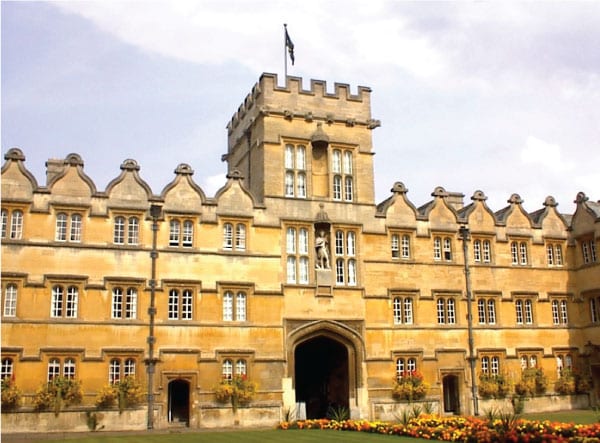
Additional Oxbridge Requirements
As well as these tests, these two additional requirements may need to be completed in your application.
Written Work
If your course doesn’t require an admissions test, you may instead need to submit a piece of written work. This is a piece of work that will be reviewed by the admissions team, be it an essay, commentary, composition or even an art portfolio. The piece/s you’re required to submit will vary based on what’s relevant to your course.
It’s common to be asked for an academically marked piece of work, meaning a piece of work that you write for school and as marked by a teacher. This means you won’t need to write a unique piece, although sometimes you will be asked to write something specifically for your application instead.
All written work submissions are digital, which means handwritten pieces will need to be scanned into your computer to be submitted. You can learn more about written work, including which courses require it, in our Oxbridge Written Work Guide.
My Cambridge Application
The My Cambridge Application (MyCApp) is required only for Cambridge undergraduate applicants and serves as a secondary application form exclusive to Cambridge. You will need to provide the same information as in your UCAS application, so ensure all details match between the forms.
The MyCApp also gives applicants the option to submit a unique Personal Statement to Cambridge, though it’s not mandatory. It’s highly recommended to complete this as it allows you to write a dedicated statement on why you should be admitted to Cambridge. With only 1,000 characters available, you’ll need to plan carefully to include the most important details.
Additionally, some applicants will need to submit a transcript of their current qualifications, which you can obtain from your school. This is not required if you are studying A-Levels or the International Baccalaureate.
The MyCApp requires a fee of $107 (£60) for any applicants outside of the UK or Ireland. The form needs to be submitted by October 22nd 2025 at the latest.
Triple your chances of Oxbridge Success with support from UniAdmissions
At UniAdmissions, we are specialists in getting applicants from across the globe into Oxbridge, UK Medicine and more. With our expertly crafted curriculum, extensive preparation materials and innovative Portal, we have developed programmes that cater to applicants of over 30 subjects across Oxford, Cambridge and more.
Discover our Full-Blue Programmes by clicking the button below to learn how you can enrol and triple your chances of success.
Getting Into Oxbridge From Canada - Interviews
Interviews are the last main requirement in your application. They take place in the first three weeks of December, with invitations being sent out roughly two to three weeks before. While this doesn’t give you much notice, you should begin preparing long before invitations are sent out.
Interview invitations are issued based on the shortlisting process, which primarily considers admission test scores and predicted grades, with some attention to Personal Statements and references. Oxford interviews about 40% of its applicants, whereas Cambridge interviews a significantly higher percentage at around 70%.
All Oxbridge interviews are formatted as traditional panel interviews, where two or three interviewers from the college. You’ll be asked questions, presented with problems to solve and expected to engage in conversation. Applicants will typically attend one to four interviews in a standard application, with each lasting around 30 – 40 minutes.
Most applicants, especially those from outside of the UK, will be attending virtual interviews rather than in-person. This means that no travel will be required, but you’ll need to ensure you have an appropriate computer set-up.
Oxford isn’t hosting any in-person interviews, but applicants for certain Cambridge colleges will be given the choice to do their interview remotely or in person. Only two colleges, Emmanuel and King’s College, currently require all applicants to attend in person, though exceptional circumstances are considered.
Due to time zone differences, you should expect to attend your interviews in the morning. Oxford uses Microsoft Teams for interviews, while Cambridge uses Zoom. Some interviews require you to use a virtual whiteboard, so ensure you’re prepared for this.
The two key ingredients to Oxbridge interview preparation are research and practice. First, you need to understand what the college is looking for, which we’d recommend doing by reading the experiences of other applicants and finding common practice questions. You also need to be aware of what types of questions could be asked for your subject.
After that, you should aim to practice as much as possible. Realistic mock interviews are especially important as they give you the feeling of being at the real thing, which helps you identify your strengths and weaknesses. These are better to do at school or with an external service, as being interviewed by someone you know takes the pressure off somewhat and makes it feel less serious than the real ones will be.

On the day of the interview, it’s essential to have a quiet, well-lit location with a stable internet connection, assuming your interview is virtual. Make sure you have a high-quality microphone and camera to communicate effectively with your interviewers. Additionally, ensure you have the necessary software installed to join the virtual meeting room. If you don’t have access to such a space, ask your school to provide one.
Most importantly, be mentally prepared for the interview. Try to stay calm beforehand; it’s natural to feel nervous, as it’s a stressful time. However, avoid panicking, as this can cause you to freeze and make mistakes more easily. Don’t worry too much about your outfit, it doesn’t matter as long as it doesn’t hinder your performance.

If you’re not accepted by the college that initially interviewed you, you may be invited to attend interviews at a different college in January. This process, known as the Winter Pool at Cambridge, indicates that the university is still interested in finding a place for you but that the college had stronger candidates. These interviews are similar to the initial ones, although each college will have a slightly different approach.
Once interviews are finished, your initial application is complete. It’s a long journey, but you’ll soon know if you’ve gotten your offer or not. Once that happens, there’s still a lot more to do…

Getting Into Oxbridge From Canada - Your Offer And Beyond
With all of the application out of the way, you’ll be eager to receive your offer from Oxford or Cambridge. They send out their offers to applicants in late January via email (As well as a letter sent afterwards). This offer letter confirms the details of your application, including the grades you need to achieve to be admitted.
If you get an offer, you’ll need to accept it by a certain deadline or else it will be withdrawn. This can be done on your UCAS account, where all of your offers will be recorded as they come in. On the account, you have the option to reject your offer or accept it as your primary or insurance choice. Don’t select your Oxbridge offer as an insurance pick or else it will be withdrawn by the university.
Along with your offer from the university, you’ll also receive a confirmation from your college. This will include a few tasks that need to be completed. The process varies between Oxford and Cambridge and will be detailed in your offer.

Receiving your offer is incredibly exciting, but not getting one can be very disheartening. It’s natural to feel disappointed, as it’s not the outcome anyone hopes for. However, remember that it’s not the end. If you applied to other UK universities, you still have up to four more chances to secure a place. If not, you can always try again in the next admissions cycle.
Even after receiving an offer, the process isn’t over. You still need to meet the grade requirements, fulfil any outstanding conditions and begin planning your move to the UK.
Completing Your Final Exams
Entry requirements for Canadian applicants can be somewhat confusing, but it’s generally expected that applicants will have completed an additional qualification alongside their High School Diploma. These can include the SATs although Advanced Placement (AP) exams are usually the most desirable. International Baccalaureates are also an option for anyone outside of the UK.
Oxford Entry Requirements - Canada
High School Diplomas: As High School Diplomas vary based on the province you’re in, there are minor differences in entry requirements depending on where you’re based. However, the typical requirements are an average of 90% – 92% depending on your course. This is based on A-Level grading, where an A* will require at least 93% and an A will require at least 90%.
Some subjects will also require specific subjects, like Medicine requiring Chemistry and at least one other science. There are also minimum levels of Mathematics required when a student is taking this subject.
International Baccalaureate: 38 – 40 (with 766 or 776 in Higher Level)
A-Levels: AAA – A*A*A
Cambridge Entry Requirements - Canada
High School Diplomas: Cambridge does not generally consider High School Diplomas as a valid form of qualification. Instead, applicants will need to ensure they complete APs or another form of additional qualification.
Advanced Placement Tests: Five Grade 5s or more (on the scale of 1 to 5)
International Baccalaureate: 40 – 42 (with 776 in Higher Level)
A-Levels: A*AA – A*A*A
Although High School Diplomas are de-emphasised at Oxbridge (especially Cambridge), it’s still important that you put effort into completing these at a high standard, as well as any other qualifications you’re competing.
When you receive your grades will depend on where you are and what qualifications you took, meaning the wait to find out if you’re going to Oxbridge can vary in length. For example, AP results are usually released in July. However, once you find out, the stress of your application will finally be over!

Although it’s exciting to think about having your place confirmed, it’s also important to consider what to do if you don’t get the grades you need. Depending on your situation, you may have other offers you can accept, either at home or in the UK.
If not, you might consider applying through UCAS Clearing, which provides a second chance for applicants who didn’t receive an offer or didn’t meet the required grades. While spaces and university options are limited—Oxford and Cambridge do not participate in Clearing—it still offers a chance if you are determined to study in the UK this year.
If none of these options work for you, you can either reapply next time or pursue a different path, such as apprenticeships or entry-level jobs, to start your career.
With that being said, it’s now time to move on to the final phase of your Oxbridge preparation journey…

Leaving Canada For Oxbridge
When moving to a new country to study at one of the world’s most renowned universities, there are a lot of moving parts and many different things to consider. Here are the most important things to organise before you leave in September.

Visas
Although Liam didn’t need to sort out a visa to travel to the UK, the majority of Canadian applicants will. To study in the UK, you need a Tier 4 (General) student visa, which anyone over the age of 16 can get if they’re able to fulfil all of the requirements.
With this visa, you can enter the UK up to one month before your course starts, so you’ll be able to travel between late August and late September.
To be eligible for the visa, you need to have a confirmed place at a UK university, evidence of your financial capabilities and accommodation and the relevant documentation, including passport, evidence of funding, confirmation of Acceptance for Studies (CAS) and more.
Medical Requirements
While there aren’t any strict medical requirements for Canadians entering the UK, it’s still best practice to be well prepared before leaving. This includes securing appropriate insurance, as international students aren’t eligible for use of the NHS, and receiving a meningitis vaccine as students are at high risk of catching this disease.
Scholarships
As already mentioned, tuition fees to study in the UK are high, especially at Oxbridge. If you believe you’ll struggle to afford these fees, there are multiple scholarships available, including those from universities, private organisations the UK government (Chevening Scholarships). As mentioned before, these are typically based on needs rather than merit, though you will still need to be performing to a high standard to be eligible. Be sure to research the options available to you.
Travel Arrangements
To get into Oxford or Cambridge, you’ll need to book flights to arrive in the country. You should be able to depart from any major international airport in Canada, where you’ll need to fly to either London Heathrow for Oxford or London Stansted for Cambridge.
From the airport, you can arrange either taxi or coach travel to enter the city. The journey from Heathrow to Oxford takes roughly 1 hour 30 minutes, while Stansted to Cambridge only takes about 30 minutes.
Packing
Knowing what to pack can be challenging, especially if it’s your first time living on your own. You might feel the urge to pack everything you own, but that’s unnecessary. It’s wise not to bring too much, as it will make the journey more stressful.
Be sure to pack appropriate clothing for the UK climate, which is generally milder than Canada (although it can get pretty cold in the winter months). Also, bring any necessary technology, books, or equipment for your course (ensuring they meet safety standards for air travel), though some items can be purchased upon arrival. You might also want to bring something to remind you of home.
Larger items like bedding, kitchen accessories (if you plan to cook), and bathroom amenities don’t need to be packed in your luggage and can be purchased when you arrive instead.
Saying Goodbye
Of course, it’s exciting to be leaving your home for Oxford or Cambridge, but you still need to consider the challenges that your loved ones may be facing, especially those who have looked after you since you were little. You all may be feeling sad about your departure, which is perfectly normal and healthy.
Due to the cost and time commitment required to travel back and Forth from the UK to Canada, visits will be much less frequent. Therefore, it’s important to make the most of the time you have before you go by visiting those you care about and saying your goodbyes. Reassure them that you’re going somewhere great to start an amazing new life as an Oxbridge student!
However, despite all this emotion, remember that it’s not permanent. You’ll still be able to visit home, most commonly during summer and winter breaks, and you’ll be able to video call as much as you like, so you’ll still be able to speak to your loved ones (though keep time differences into account when calling!).

Adjusting To The UK
With everything sorted out, you’ll find yourself in your new accommodation at Oxford or Cambridge in no time. Now that you’re here, you may feel excited to get started and meet new people, but you might also feel nervous, homesick or isolated due to being one of only a few Canadian students in your year. If you’re feeling this way, here are some ways to help you adjust to your new home:
Join Societies
Oxford and Cambridge both house Canadian societies dedicated to students from your home country. These are a great place to meet your peers who are in the same situation as you and bond over your shared experiences. As well as this, you should also look at the other societies and sports teams available at both your college and the university as a whole – they have something for everyone!
Take Part in College Activities
You might be hesitant, but getting involved in college activities can help you acclimate to your new environment and connect with your peers. One key event for new students is Freshers Week, which typically occurs just before classes start.
Freshers Week features a wide range of activities, events, and parties designed to welcome students to the university. There are also events specifically for international students, providing a great opportunity to meet others who are experiencing similar feelings.
Explore The City
You don’t have to be taking part in activities to get outside and explore your new city. Sometimes it can be nice just to step out of your college and see what Oxford and Cambridge have to offer, be it venues, parks or shops. Plus, it’s a great way to get fresh air and exercise
Don’t Worry About Work Yet
Oxbridge students have a tonne of work to complete, but this doesn’t need to start as soon as you set foot in the city. The first few weeks are there to help you settle in, meet new people and learn about your new surroundings, so don’t immediately start intensive work – there’ll be plenty of time for that as the course goes on!
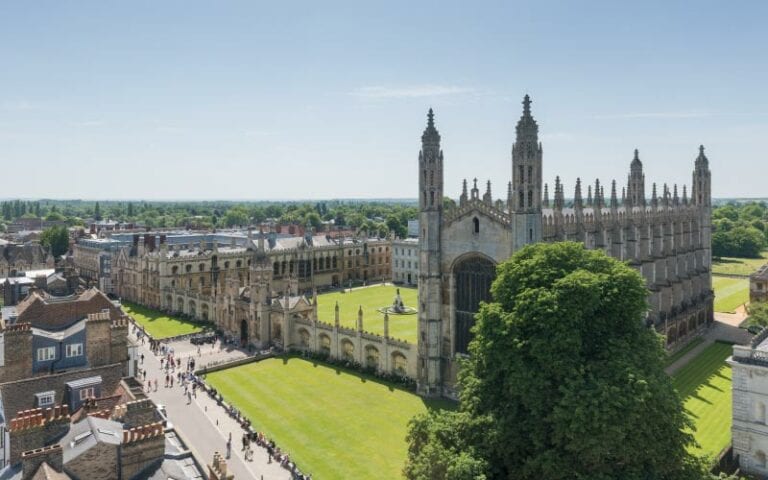
So, that’s all the essential information you need to know about your Oxford or Cambridge application as a Canadian. This guide has only offered an overview of what you need to know about each component, so be sure to dig deeper and discover even more within our collection of Oxbridge application guides. Before we finish, here’s a closing piece of advice from Liam:

We hope this guide has been helpful to you, and we wish you the very best of luck with your application. If you want to discover how we can drastically improve your chances of getting your offer, please visit our Full-Blue Programmes page and discover our truly effective support.
We support Oxbridge applicants from all over the world to get their Oxbridge offer
Our Full-Blue Programmes are suitable for anyone who is dedicated to getting their offer at Oxford of Cambridge, no matter where you’re from. Our students have access to everything they need to prepare for each stage of the admissions process.
This includes one-to-one tuition, hundreds of preparation materials, live courses, unlimited Personal Statement/essay marking and much more. Our support is suited to your needs to ensure you get the most of it.
Discover our Full-Blue Programme by clicking the button below to learn how you can enrol and triple your chances of success.

